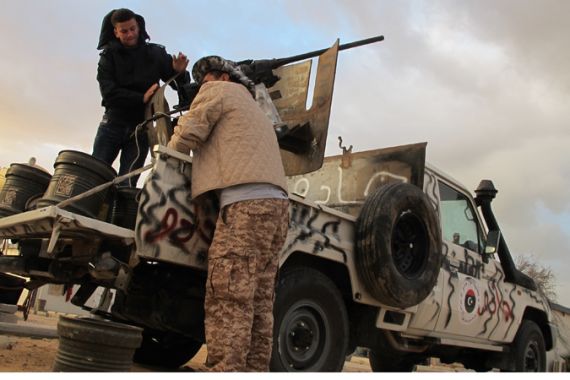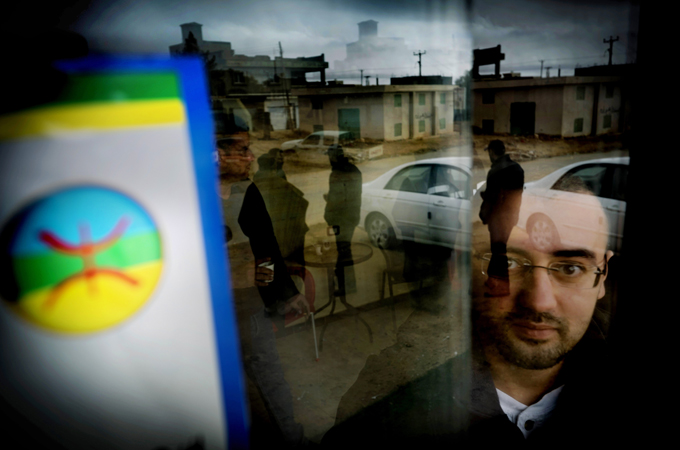Libya’s Berbers fear ethnic conflict
The country’s main ethnic minority feels targeted amid growing political upheaval.

Jadu, Libya – Almost every Libyan knows Shokri Agmar. Back in 2011, they would see him daily on TV, in a programme broadcast from Qatar. The 33-year-old lawyer is the presenter of Libya’s first-ever programme in the Amazigh language.
“I had mixed feelings,” Agmar told Al Jazeera from a cafe in downtown Tripoli. “On the one hand, my people were fighting against Gaddafi in the mountains; on the other, it was a unique chance to boost the morale of a long-oppressed people like us, the Amazigh.”
Keep reading
list of 4 itemsIconic Algerian singer and Berber idol Idir dies at 70
Morocco’s Amazigh push for official recognition of their new year
Berbers welcome Amazigh New Year
Also called Berbers, the Amazigh are native inhabitants of North Africa, with a population extending from Morocco’s Atlantic coast to the west bank of the Nile in Egypt. The arrival of Arabs in the region in the seventh century was the beginning of a slow yet gradual process of Arabisation, which intensified during Muammar Gaddafi’s rule (1969-2011).
Unofficial estimates put the number of Amazighs in Libya at around 600,000 – about 10 percent of the total population. But today, they say they are feeling increasingly targeted amid growing political upheaval in the country.
 |
|
Former TV presenter Shokri Agmar in his native town of Jadu [Ricardo G Vilanova/Al Jazeera] |
Agmar lives between Tripoli and Jadu, his native village in the Nafusa mountain range. It’s less than 200km between both cities, but for a journey that should take less than two hours, he needs to allow two days due to the ongoing conflict.
Libya is in a state of political turmoil that has pushed the country to a civil war; there are two governments and two separate parliaments – one based in Tripoli and the other in Tobruk, 1,000km east of the capital. The latter, set up after elections in June when only 10 percent of the census population took part, has international recognition.
To get to Nafusa, Agmar needs to drive west along the coast, cross into Tunisia and get back to Libya through the border post further south, which leads directly to the mountains. That’s the only way to dodge the Libyan battlefield, where several militias are grouped into two paramilitary alliances; Libya Dawn, led by the Misrata brigades controlling Tripoli, and Dignity, commanded by Khalifa Haftar, a Tobruk-based former army general.
The Amazigh in Libya are seemingly trapped in the crossfire, and with still unattended demands focusing on language recognition as well as the right to decide on the name of the country, the flag and the anthem.
However, a movement for an autonomous Amazigh region in Libya is also taking shape.
“Other than language and culture, we need to address political demands too,” Mazigh Buzakhar, co-founder of Tira for Amazigh Research and Studies, told Al Jazeera from the headquarters of the organisation in Tripoli.
Buzakhar is one of the authors behind a constitution draft for the Nafusa region. The boundaries of the region in question are already stated in its article 1: “an area between coast of Zwara, the mountains of Nafusa and the oasis of Ghadames”.
“Neither Tripoli nor Tobruk will support such a project, as both sides of the conflict are against human rights,” said the political activist, adding that whoever wins the war “will fight us afterwards”.
Younes al-Tabaui, a member of Libya’s Tebu community and a Minister of Culture in the Tripoli government, admitted that minorities in Libya “are in a very delicate position” but rejected the possibility of an Arab-Amazigh ethnic conflict in the short term.
“The Amazighs’ main problem is that they have not yet taken the inititiative; they have not yet made a clear statement regarding the current political division,” Tabaui told Al Jazeera.
RELATED: Libya’s ‘pearl of the desert’
On his way to the Tunisian border, Agmar has to drive across Zwara, an Amazigh stronghold that has been the target of several airstrikes in recent weeks. Local militia commanders told Al Jazeera that their forces were in a “self-defence position”.
Fathi Ben Khalifa, a native of Zwara and an executive member of the World Amazigh Congress – an umbrella organisation for the Amazigh people in North Africa – said he fears the ongoing war “will eventually lead to a genocide campaign” against the Amazigh people.
We are being pushed towards one side because Zintan and the rest of our enemies are siding with Tobruk. However, we all know that we will end up protecting ourselves from the Libya Dawn militia.
Agmar has to queue for hours at the Tunisian border post 60km west of Zwara. After spending the night in Tataouine in southeastern Tunisia, the young lawyer heads for the Dehiba-Wazzin border crossing, where Tunisian officials are curious about Jadu’s position in the war. Today, Tunisia only operates flights to Libya via Tobruk, an unequivocal sign of support to General Haftar’s forces.
The main road across the Nafusa plateau looks empty as the price of fuel has skyrocketed from three dinars ($1.82) per 20 litres to 40 dinars ($33.32). The situation is reminiscent of the 2011 war, when fuel, food and all sort of supplies arrived via Tunisia.
“I still keep my business running thanks to what I had stored,” Atheel Ayub, owner of the only open restaurant in the town of Kabao, told Al Jazeera. “Before, I’d bring three full trucks from Tripoli but not today. They’d take them away from me at the six checkpoints down the valley.”
Agmar’s native town of Jadu lies less than 100km further east. Fathi Haslok, chairman of the Jadu council and an executive member of the Libyan Amazigh Supreme Council – a body that includes representatives from the seven main Berber towns in the country – received Al Jazeera at his office in the municipality building.
“We live in the west of the country so we are administratively linked to Tripoli, but that doesn’t mean we’re siding with them,” Haslok said.
Not far away from Haslok’s office is the headquarters of one of Jadu’s local militias. With 150 fighters under his command, Arif al-Haris talks of “a state of maximum alert”. The neighbouring village is Zintan, an Arab enclave in the Nafusa mountains.
“We are being pushed towards one side because Zintan and the rest of our enemies are siding with Tobruk. However, we all know that we will end up protecting ourselves from the Libya Dawn militia,” Haris told Al Jazeera.
In a TV programme broadcast from Zintan last week, Colonel Idris Mady, head of the Zintan forces, urged his Amazigh neighbours to put down their weapons “or face the consequences.”
Agmar is not welcome in Zintan so he cannot drive further east. He takes a detour to the right, to one of those ancient Berber villages perched on the top of a cliff. The views are surreal but the echoes of artillery coming from Wotya – a location down the valley which has witnessed intense fighting in recent weeks – make it difficult to forget the war.
“Who could possibly imagine such a mess three years after Gaddafi’s death?” laments Agmar. He admits he has not yet decided whether he will stay in Jadu, go back to Tripoli or, eventually, leave the country again.